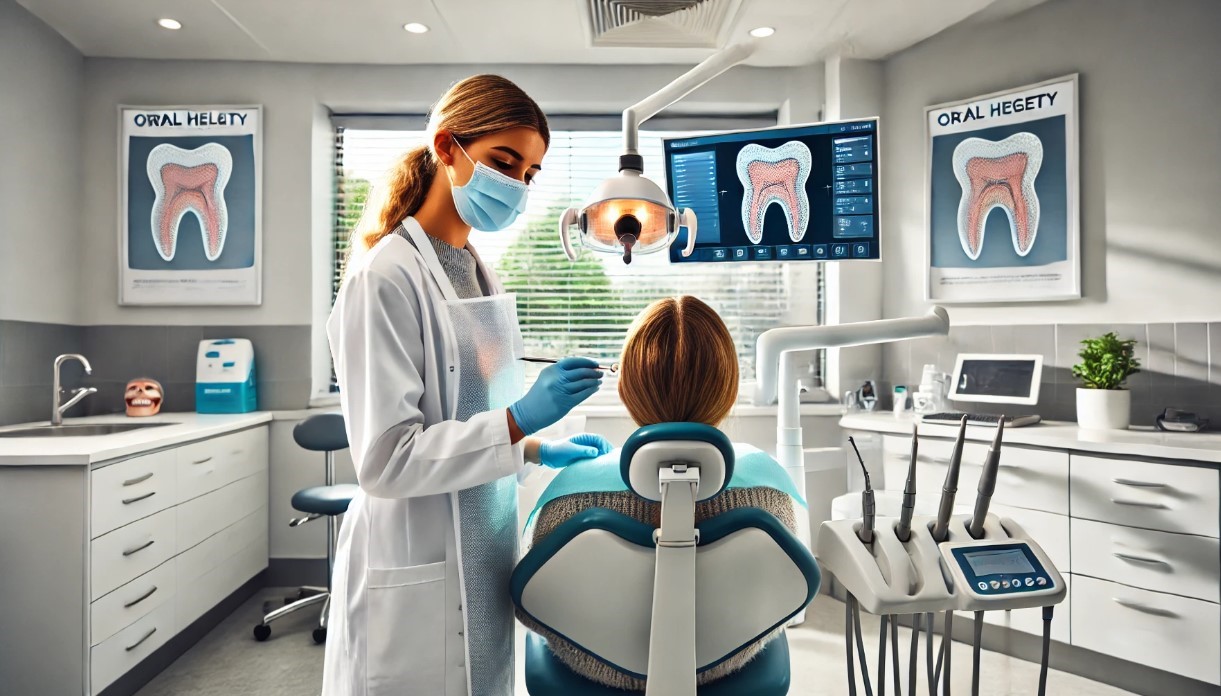Dental hygienists in the UK are an integral part of the dental care industry, playing a key role in preventing and managing oral health issues.
Salary for dental hygienist vary depending on a range of factors, including experience, location, and whether they work in private practices or for the NHS.
In this blog, we will explore salary ranges, regional variations, entry requirements, and the pathway to becoming a dental hygienist, along with the skills needed to excel in the role.
What is the Role of a Dental Hygienist in the UK?

A dental hygienist focuses primarily on preventing and treating gum diseases and maintaining oral hygiene. Their day-to-day tasks include scaling and polishing teeth, applying treatments to prevent cavities, and educating patients on how to care for their teeth and gums.
Hygienists work alongside dentists, often being the first point of contact for patients seeking preventative dental care.
To practice in the UK, a dental hygienist must be registered with the General Dental Council (GDC) after completing an approved diploma or degree in dental hygiene.
What is the Average Salary for Dental Hygienists in the UK?

The average salary for dental hygienists in the UK can vary significantly depending on the region, experience, and type of employer (NHS vs. private).
The average hourly pay for dental hygienists in the UK is approximately £30.35, which translates to an annual salary range of £38,000 to £78,000.
| Experience Level | Average Hourly Pay (£) | Annual Salary Range (£) |
|
Entry-Level (0-2 years) |
24-28 |
38,000-48,000 |
|
Mid-Career (3-5 years) |
30-34 |
50,000-65,000 |
|
Experienced (5+ years) |
35-38 |
60,000-78,000 |
In private practices, dental hygienists generally earn higher salaries, particularly in major urban centres like London. NHS dental hygienists tend to earn slightly less, although benefits like pensions and job security make these roles attractive to many professionals.
What is the Starting Salary for Dental Hygienists?

Newly qualified dental hygienists typically start with salaries ranging between £24,000 and £30,000 per year. The starting salary depends on whether the hygienist works for the NHS or a private practice.
Newly qualified professionals usually begin on lower pay scales but can expect quick salary growth as they gain experience.
| Practice Type | Average Starting Salary (£) |
|
NHS Practice |
24,000 – 27,000 |
|
Private Practice |
28,000 – 30,000 |
Hygienists starting in private practice can expect slightly higher wages than their NHS counterparts. However, the opportunities for salary progression in both sectors are strong.
What are the Regional Salary Variations for Dental Hygienists?

Regional salary variations for dental hygienists are largely driven by local demand, cost of living, and whether they are working for the NHS or in private practice.
London and Southeast England tend to offer the highest salaries, with dental hygienists in these regions earning between £35 and £38 per hour.
In contrast, those working in regions like Scotland, Wales, and Northern Ireland earn lower salaries, often ranging from £24 to £30 per hour.
|
Region |
Hourly Pay (£) |
Annual Salary Range (£) |
|
London |
35-38 | 50,000-78,000 |
|
Southeast England |
34-37 |
48,000-75,000 |
|
Scotland |
24-30 |
38,000-60,000 |
|
Wales |
25-30 |
38,000-62,000 |
| Northern Ireland | 24-28 |
36,000-58,000 |
Urban areas, particularly London, pay more because of the higher demand for dental services and the higher cost of living.
What is the Hourly Pay for Dental Hygienists?

Hourly pay for dental hygienists can range significantly based on experience, location, and the sector in which they work. The national average stands at £30.35 per hour, but it can go up to £38 per hour in private practices in London.
|
Experience Level |
NHS Hourly Pay (£) |
Private Sector Hourly Pay (£) |
|
Entry-Level (0-2 years) |
24-26 |
28-30 |
|
Mid-Career (3-5 years) |
28-32 |
32-35 |
| Experienced (5+ years) |
34-38 |
35-38 |
Private sector hygienists generally earn higher hourly wages due to higher demand and the flexibility offered by these roles. NHS hygienists earn competitive wages but generally at a slightly lower rate than their private counterparts.
Part-Time vs Full-Time Pay for Dental Hygienists
Many dental hygienists in the UK opt for part-time work due to the flexibility it offers. The hourly rate for part-time hygienists is typically the same as full-time employees, but annual income can be lower depending on the number of hours worked. Full-time hygienists, on the other hand, earn more annually due to the increased hours.
| Employment Type | Average Hourly Pay (£) | Average Annual Salary (£) |
|
Full-Time |
30-35 |
50,000-78,000 |
|
Part-Time |
30-35 |
25,000-50,000 |
Full-time hygienists benefit from consistent income and, in some cases, additional benefits such as pensions and paid leave. Part-time roles offer more flexibility but may not come with the same benefits.
How to Become a Dental Hygienist in the UK?

Becoming a dental hygienist in the UK requires formal education, practical experience, and registration with the General Dental Council (GDC). There are two primary routes to becoming a dental hygienist: through a university course or by working towards the role through a related profession, such as a dental nurse.
University Course
To become a dental hygienist, you’ll need to complete a higher education diploma or degree approved by the GDC. Courses usually last two to four years and focus on:
- Dental hygiene
- Oral health science
- Dental hygiene and therapy
Having experience in a dental or healthcare setting, such as shadowing a dental nurse, can boost your application. Some students may also receive financial support through the NHS Learning Support Fund.
Entry Requirements
To apply for a university course, you’ll typically need:
- 5 GCSEs at grades 9 to 4 (A* to C), including English, maths, and science.
- 2 or 3 A levels, or equivalent, including biology for a degree.
What It Takes to Be a Dental Hygienist?
Technical proficiency and people skills are both necessary for dental hygienists to be successful. They must possess a strong understanding of dental practices, customer service skills, and the ability to work well under pressure.
Skills and Knowledge
- Knowledge of medicine and dentistry – to perform oral hygiene treatments.
- Attention to detail – essential for precise, safe work on sensitive areas of the mouth.
- Communication skills – explaining dental hygiene techniques to patients in an approachable way.
- Empathy and understanding – dealing with patients who may be anxious about dental treatment.
- Patience – especially important in dealing with children and nervous patients.
Restrictions and Requirements
As dental hygienists may work with vulnerable adults and children, they must undergo enhanced background checks via the Disclosure and Barring Service (DBS).
What You’ll Do as a Dental Hygienist?

Dental hygienists have a broad range of duties, all aimed at improving patients’ oral health. Day-to-day tasks include:
- Cleaning and polishing teeth to remove plaque and prevent gum disease.
- Applying dental sealants to protect teeth from decay.
- Teaching proper brushing and flossing techniques to patients.
- Referring patients to dentists for more complex treatments.
- Promoting good oral health to both children and adults.
- Maintaining patient records, ensuring treatments are accurately logged.
Working Environment
Dental hygienists typically work in dental practices, NHS or private hospitals, or health centres. The role involves wearing protective clothing, including masks, gloves, and gowns, to prevent the spread of infection and protect both the hygienist and the patient.
Conclusion
Dental hygienists in the UK enjoy competitive salaries, flexible working conditions, and the opportunity to play a vital role in maintaining public health.
The salary varies based on experience, location, and the sector in which a hygienist works. London and the Southeast offer the highest wages, but opportunities exist across the UK for those looking to enter the field.
Whether you’re looking to become a dental hygienist or are already in the field, the profession offers strong earning potential, job security, and numerous opportunities for career growth.
Frequently Asked Questions (FAQs)
How does experience affect a dental hygienist’s salary?
For a dental hygienist, experience is a major factor in pay. Entry-level hygienists typically start around £24,000 to £30,000 annually, but as they gain experience, their pay can rise to £50,000 to £78,000, particularly in private practice or in higher-demand regions like London.
What is the average pay for a dental hygienist in London?
In London, dental hygienists generally earn higher wages compared to other parts of the UK, with hourly pay ranging from £35 to £38 per hour, translating to annual salaries of £50,000 to £78,000. This is largely due to the high demand for private dental care and the cost of living in the city.
Is there a salary difference between NHS and private practice?
Yes, dental hygienists working in private practice often earn more than those working in the NHS. Private sector hourly rates can go as high as £38 per hour, whereas NHS hygienists typically earn between £24 to £34 per hour, depending on their experience and region.
What qualifications are required to become a dental hygienist in the UK?
To become a dental hygienist in the UK, you need to complete an accredited higher education diploma or degree in dental hygiene, oral health science, or dental hygiene and therapy.
These programs must be approved by the General Dental Council (GDC). Typically, 5 GCSEs (including English, maths, and science) and 2 or 3 A levels (including biology) are required to apply.
Do dental hygienists earn more with dual qualifications in dental hygiene and therapy?
Yes, dental hygienists who are also qualified in dental therapy typically earn more, with annual salaries reaching up to £85,000 depending on experience and location.
Their broader scope of practice allows them to perform more advanced dental procedures, increasing their value in both private and NHS settings.
What are the best regions for dental hygienists in terms of salary?
London and Southeast England offer the highest salaries for dental hygienists, with average hourly rates of £35 to £38. Regions such as Scotland, Wales, and Northern Ireland tend to offer lower pay, with hourly rates ranging from £24 to £30.
How can I increase my salary as a dental hygienist?
To increase your salary, consider gaining more experience, pursuing further qualifications (e.g., in dental therapy), or working in private practice, particularly in high-demand regions like London. Specializing in advanced treatments or management roles within dental practices can also significantly boost earnings.




